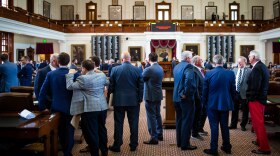A controversial bill adding restrictions to the voting process in Texas cleared another hurdle on Monday after enough Democrats returned to Austin to restore quorum.
That quorum, however, didn’t erase the conflict between the two parties over the bill, which would impose limits on what counties can do to open up voting hours and voting options.
“Twenty four hour voting is being taken away,” said Democrat Ann Johnson of Houston. “We also saw and heard from [Harris County] Administrator Longoria that 54.9% of the folks who took advantage of 24-hour voting were communities of color.”
Pushing back, the bill’s House sponsor, Republican Andrew Murr of Junction, disagreed 24-hour voting is being "taken away."
“We saw most jurisdictions, until the pandemic occurred, no one had tried that 24-hour process,” he said.
The vote broke down along strict party lines, with all nine Republicans on the committee voting for the bill and five Democrats voting against. Only one committee member, Democrat Victoria Neave of East Dallas and Mesquite, was absent.
House Republicans changed the bill from what was passed earlier this month in the Senate. They replaced the text of SB 1 with the language from a version introduced in the House during the first special session in July.
Major Provisions Of The House Version:
- Polling places would have to be inside a building, and the only voters who could vote from a vehicle must be physically unable to enter a voting location without assistance or without injuring the voter’s health.
- 24-hour voting would be banned. Early voting could not happen before 6 a.m. or after 10 p.m.
- People who assisted someone with a disability would have to take an oath, on penalty of perjury, that the voter has said they are indeed eligible for help.
- Partisan poll watchers may not be removed from a polling place unless the poll watcher has violated the law at least twice. The election judge or clerk would have had to observe at least one of the violations.
- An application for a mail-in ballot must have a driver’s license number or personal ID number issued by the Texas Department of Public Safety. If not, the voter must provide the last four digits of his or her social security number, or provide a statement “that the applicant has not been issued” these numbers.
- Local election officials would be barred from sending out vote by mail applications to people who did not request them.
Bill Sparks Heated Debate Among Community Members, Advocates
Over 70 people testified on Monday, both for and against the measure.
Candis Houston, a teachers’ union president in the Houston area, said her daughters travelled home from college in Mississippi to vote in Harris County last fall. They used the drive-through option because one of her daughters was still honoring a COVID-19 quarantine period.
“We thought … it was best for the community for us to do drive-through voting,” Houston said. “We should be encouraging people to vote, and not limiting where and when they can vote.”
Yet other people who testified repeated concerns about voter fraud, despite no evidence that the problem is widespread in Texas or that it affected the outcome of a statewide or local race.
Still others wanted more freedom given to partisan poll watchers to observe election operations.
“During the 2020 election I volunteered as a poll watcher for the first time,” said Stephanie Smith of Dallas. “I was obstructed from performing my duties. I was actually illegally removed for performing my duties.”
Many people inclined to support the bill, however, were upset that the penalty for election judges who blocked poll watchers is softer in the House substitute. SB 1 considers it a Class A misdemeanor, while the substitute makes it a Class B misdemeanor.
“There must be oversight that is not from inside of government,” said James Keller. “It is up to a candidate to decide for themselves — not for the state — who is going to watch out for my interest.”
Advocates for people with disabilities saw the bill as a missed opportunity to make voting easier for that community after years of lobbying lawmakers.
Bob Kafka, an organizer with the disability rights group ADAPT of Texas, said finding assistance is hard enough without additional rules for the people who help voters with disabilities.
“I just really want to emphasize that the disability vote is growing,” he said, urging the committee to adopt a measure that would make it easier for people with disabilities to vote. “We think some of the things specifically in the bill will harm the growth of the disability vote.”
The bill now heads to the full House, where it is likely to pass with Republican support. Differences with the Senate version will have to be ironed out in conference committee before it becomes law.
KERA News is made possible through the generosity of our members. If you find this reporting valuable, consider making a tax-deductible gift today. Thank you.
Got a tip? Email Bret Jaspers at bjaspers@kera.org. You can follow Bret on Twitter @bretjaspers.
Copyright 2021 KERA. To see more, visit KERA.







